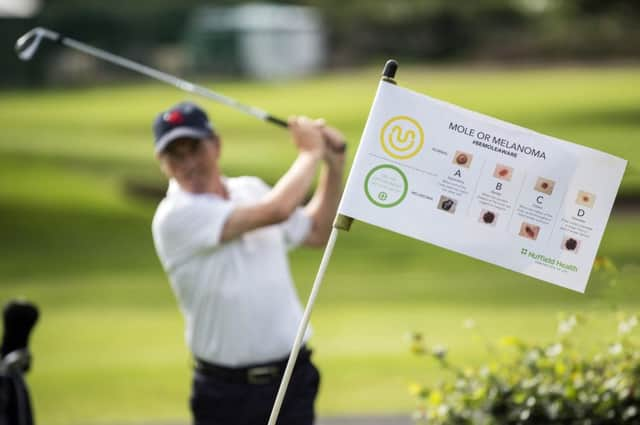Scots golfers warned of increased skin cancer risk


Even though the average round of golf lasting more than three hours health experts say many golfers do not even think about applying sunscreen before teeing off.
Leading cancer specialists warn that just an hour on the course on a summers’ day can give them five times the dangerous ultra-violet rays which can cause sunburn and lead to cancer.
Advertisement
Hide AdAdvertisement
Hide AdDr Girish Gupta, Consultant Dermatologist for Nuffield Hospital in Glasgow, said: “During every hour spent on the golf course, recreational golfers can receive 3.5 to 5.4 times the amount of UV radiation exposure needed to cause a sunburn. All this excessive UV radiation can lead to skin cancer.”
The not-for-profit Nuffield has now launched a Scotland-wide campaign to encourage golfers to wear protection and also to be aware of the need to check moles on their bodies and look out for any changes which could be a sign of skin cancer, including melanoma.
Dr Gupta said: “Melanoma rates are increasing every year but if detected early there is less chance of melanoma spreading.
“Everyone should be aware of their moles and should examine their skin on a regular basis looking for the signs of melanoma, a new mole that has developed or an existing mole which changes by becoming irregular in shape, colour and size.”
In recent years top golfers Australian Adam Scott and Irishman Padraig Harrington have required treatment for skin cancer after finding unusual spots on their faces. Both have spoken about their scares and now talk about the benefits of wearing sunscreen and protective clothing and headwear while outdoors.
Scottish professional golfer Stephen McAllister has backed the Nuffield’s new campaign, saying: “Players at all levels should be aware of the increased risk to skin cancer if they don’t take care. So many people could be saved if they knew the signs of what to look out for at an early stage.”
The new campaign highlights the importance of regular self-examination, giving tips and advice on what to look out for by learning about different moles. It is also urging social media users have also been encouraged to share a ‘backie’ online instead of a ‘selfie’, to help raise awareness of the need to check those hard to reach areas.
Cases of skin cancer in Scotland increasing by more than 30% in the past decade and it is now the sixth most common form of the disease with 1,172 diagnoses of melanoma a year.
Advertisement
Hide AdAdvertisement
Hide AdNuffield Hospital has introduced a state-of-the-art mole mapping service to help with such early detection.
Whole body digital photographs are taken via a digital photo-dermoscopy surveillance service and, thereafter, examined by a consultant dermatologist to identify any suspicious lesions.
Malignant melanoma, if identified, can then be detected at an early stage when treatment is most effective, experts say.